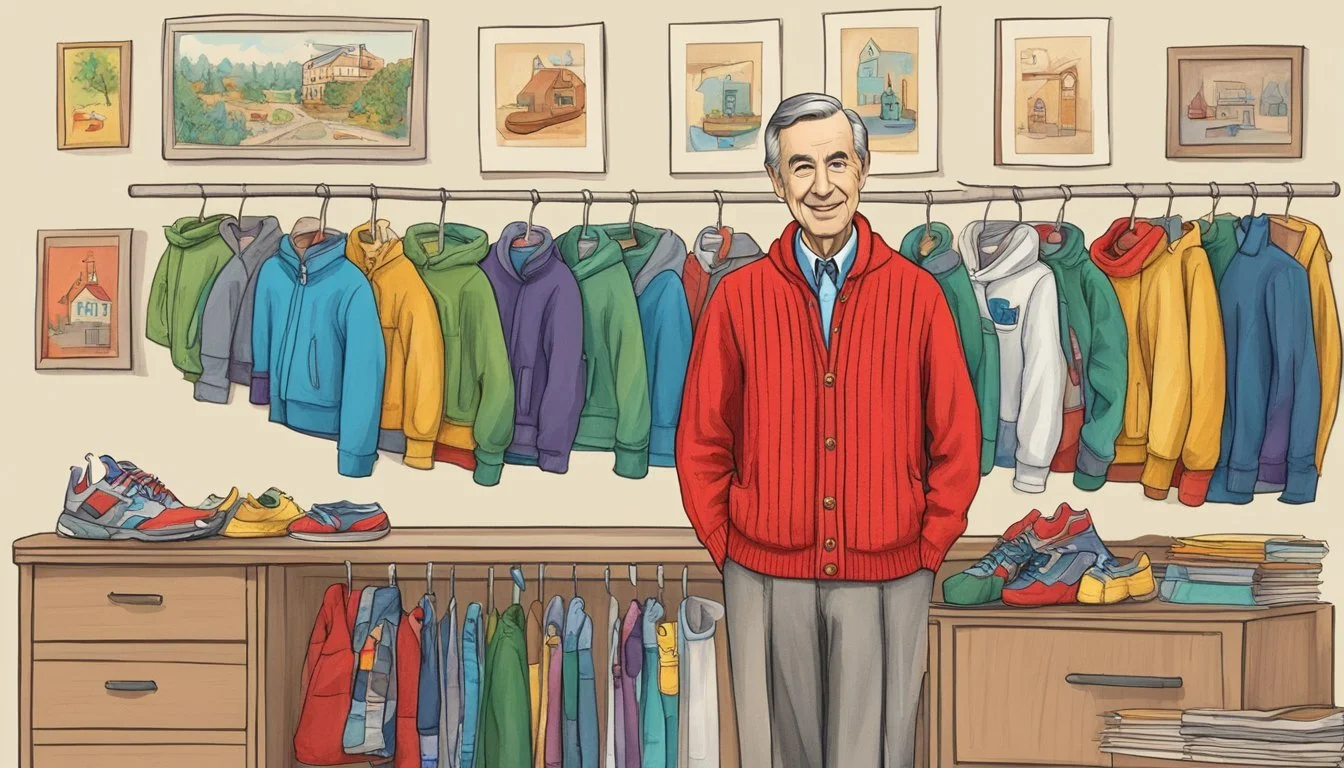Kindness on Camera: The Real Mr. Rogers
Exploring the Man Behind the Iconic Neighborhood
Fred Rogers, beloved children's television host, left an indelible mark on generations of Americans through his show "Mister Rogers' Neighborhood." The 2019 film "A Beautiful Day in the Neighborhood" brings his legacy to the big screen, starring Tom Hanks as the iconic Mr. Rogers. The movie explores Rogers' profound impact on others, particularly through his relationship with cynical journalist Tom Junod.
The film draws inspiration from real events, focusing on Rogers' friendship with Junod, who was assigned to write a profile on the TV host. As their relationship develops, Junod's skepticism gives way to a deeper understanding of Rogers' genuine kindness and empathy. This transformation reflects the power of Rogers' philosophy and his ability to touch lives both on and off camera.
"A Beautiful Day in the Neighborhood" serves as a reminder of the enduring relevance of Rogers' message in today's world. By showcasing his authentic compassion and ability to connect with people, the film invites viewers to reflect on the importance of kindness in their own lives. It offers a glimpse into the real Mr. Rogers, demonstrating how his on-screen persona aligned seamlessly with his off-screen character.
The Legacy of Fred Rogers
Fred Rogers left an indelible mark on children's television and American culture through his groundbreaking show and unwavering commitment to kindness and empathy.
Influential Life and Career
Fred Rogers began his career in television in 1953, eventually creating and hosting "Mister Rogers' Neighborhood" in 1968. The show ran for 31 seasons, reaching millions of children across the United States.
As a Presbyterian minister, Rogers viewed his work on television as an extension of his ministry. He addressed complex topics like death, divorce, and racism in ways children could understand.
Rogers received numerous awards for his contributions to children's education and television, including the Presidential Medal of Freedom in 2002.
Impact on Children's Television
"Mister Rogers' Neighborhood" revolutionized children's programming with its gentle pace and focus on emotional intelligence. Rogers spoke directly to his young viewers, creating a sense of intimacy and trust.
The show's format encouraged children to explore their feelings and develop self-esteem. Rogers' approach contrasted sharply with the fast-paced, commercial-driven content common in children's television.
His influence extended beyond his own show, inspiring a generation of educators and content creators to prioritize children's emotional well-being.
Values and Philosophy
Rogers' core philosophy centered on treating children with respect and honesty. He believed in acknowledging children's feelings and helping them navigate complex emotions.
His approach to masculinity was groundbreaking, demonstrating that men could be gentle, empathetic, and vulnerable. Rogers often expressed love and affection openly, challenging traditional gender stereotypes.
He emphasized the importance of community and acceptance, famously telling children, "I like you just the way you are." This message of unconditional love and acceptance remains a cornerstone of his enduring legacy.
Bringing Mr. Rogers to the Big Screen
The beloved children's television host Fred Rogers came to life on the big screen in "A Beautiful Day in the Neighborhood." This film adaptation brought together talented actors, directors, and writers to capture the essence of Mr. Rogers for a new generation.
Casting Tom Hanks as Mr. Rogers
Tom Hanks took on the role of Fred Rogers, embodying the gentle and kind-hearted nature of the iconic TV personality. Hanks' portrayal aimed to capture Rogers' unique mannerisms and soft-spoken demeanor. The two-time Academy Award winner donned the signature cardigan sweater and sneakers, bringing authenticity to the character.
Hanks studied Rogers' movements and speech patterns to deliver a convincing performance. His casting was widely praised for bringing warmth and sincerity to the role, helping audiences connect with the story on an emotional level.
Direction by Marielle Heller
Marielle Heller directed "A Beautiful Day in the Neighborhood," bringing her unique vision to the project. Heller's approach focused on capturing the essence of Fred Rogers rather than creating an exact biographical account.
She structured the film like an episode of "Mister Rogers' Neighborhood," incorporating elements familiar to fans of the show. This creative decision helped maintain the spirit of Rogers' work while telling a new story.
Heller's direction emphasized the impact of Rogers' kindness on others, particularly through his relationship with a cynical journalist. Her storytelling approach balanced nostalgia with contemporary relevance.
The Role of Screenwriters
Screenwriters Micah Fitzerman-Blue and Noah Harpster faced the challenge of adapting Fred Rogers' life and impact into a compelling narrative. They based their script on the real-life friendship between Rogers and journalist Tom Junod, though they took some creative liberties with the story.
The writers focused on crafting dialogue that captured Rogers' unique way of speaking and interacting with others. They incorporated elements of imagination, a key aspect of Rogers' show, into the film's structure and storytelling.
Fitzerman-Blue and Harpster's script balanced moments of gentle wisdom with deeper explorations of human emotions, reflecting the profound impact Rogers had on both children and adults.
Exploring the Themes of the Film
"A Beautiful Day in the Neighborhood" delves into profound themes that resonate deeply with audiences. The film explores human connections, personal growth, and emotional healing through its compelling narrative.
Friendship and Connection
Fred Rogers forms an unlikely friendship with Lloyd Vogel, a cynical journalist. Their relationship showcases the transformative power of genuine human connection. Rogers' unwavering kindness and empathy gradually break down Vogel's emotional barriers.
The film illustrates how authentic friendships can foster personal growth and healing. Rogers' patient approach helps Vogel confront his past traumas and rebuild strained family relationships.
Through this central relationship, the movie emphasizes the importance of open communication and active listening in forming meaningful connections.
The Power of Forgiveness
Forgiveness emerges as a central theme in the film, particularly in Vogel's journey. The journalist struggles with unresolved anger towards his father, which affects his personal and professional life.
Rogers gently guides Vogel towards understanding and forgiving his father's past mistakes. This process is portrayed as difficult but ultimately liberating for Vogel.
The film demonstrates how forgiveness can:
Heal deep-seated emotional wounds
Improve family dynamics
Lead to personal growth and inner peace
Challenges of Masculinity
The movie addresses societal expectations of masculinity through Vogel's character arc. Initially, Vogel embodies a tough, emotionally distant persona often associated with traditional masculinity.
Rogers presents an alternative model of masculinity - one that embraces emotional vulnerability and kindness. This contrast challenges viewers to reconsider societal norms about male behavior and emotional expression.
The film portrays emotional growth as a sign of strength, not weakness. It encourages men to:
Express feelings openly
Seek help when needed
Value compassion and empathy
The Real-Life Inspiration
The movie "A Beautiful Day in the Neighborhood" draws from a real-life friendship between Fred Rogers and journalist Tom Junod. Their connection began with a magazine profile and blossomed into a transformative relationship.
Tom Junod's Esquire Profile
In 1998, Tom Junod wrote a profile of Fred Rogers for Esquire magazine titled "Can You Say... Hero?" The article earned Junod a National Magazine Award nomination. It delved into Rogers' life, work, and impact on children's television.
Junod initially approached the assignment with skepticism. He was known for writing critical pieces about public figures. However, Rogers' genuine kindness and empathy surprised him.
The profile painted a vivid picture of Rogers' daily routines, his interactions with fans, and his unwavering commitment to children's well-being. It highlighted Rogers' ability to connect with people of all ages through simple yet profound conversations.
Real-Life Friendship of Rogers and Junod
The relationship between Rogers and Junod extended beyond the initial interview. They maintained contact for years after the article's publication. Rogers became a mentor and friend to Junod, often offering guidance and support.
Their friendship influenced Junod's personal and professional life. He credits Rogers with helping him become a better listener and more empathetic person. The journalist has spoken about how Rogers' philosophy of kindness and understanding impacted his approach to writing and human interactions.
In the film, the character Lloyd Vogel is loosely based on Junod. While some details are fictionalized, the core of their friendship remains true to life. The movie captures the essence of how Rogers' genuine care and attention could profoundly affect those around him.
The Characters and Cast
The film's ensemble brings to life the story of Fred Rogers and his impact on a cynical journalist. Key performances capture the essence of real individuals while fictional elements enhance the narrative.
Matthew Rhys as Lloyd Vogel
Matthew Rhys portrays Lloyd Vogel, a character inspired by journalist Tom Junod. Vogel is a cynical writer assigned to profile Fred Rogers for Esquire magazine. Rhys captures Vogel's initial skepticism and gradual transformation as he interacts with Rogers.
The character arc showcases Vogel's personal struggles, especially his strained relationship with his father. This fictional element adds depth to the story, highlighting Rogers' influence on adults as well as children.
Rhys' performance balances Vogel's hard-edged skepticism with vulnerability, creating a relatable protagonist for viewers.
Chris Cooper's Role
Chris Cooper plays Jerry Vogel, Lloyd's estranged father. This character, while fictional, serves as a catalyst for Lloyd's emotional journey. Cooper brings nuance to the role of a flawed father seeking reconciliation.
Jerry's presence in the story allows for exploration of themes like forgiveness and healing. Cooper's portrayal adds complexity to the family dynamics, creating tension and opportunities for growth in Lloyd's character.
The interactions between Jerry and Lloyd provide a backdrop for Fred Rogers' teachings on emotional intelligence and conflict resolution.
Supporting Cast Insights
Susan Kelechi Watson plays Andrea, Lloyd's wife, offering a grounding presence in his life. Her character provides support and perspective as Lloyd grapples with his assignment and personal issues.
Maryann Plunkett portrays Joanne Rogers, Fred's wife. Though her role is limited, it offers glimpses into Fred Rogers' personal life and the support behind his public persona.
Enrico Colantoni appears as Bill Isler, president of Fred Rogers' production company. His character provides context for Rogers' work and dedication to children's education.
These supporting roles create a rich tapestry, illustrating the wider impact of Fred Rogers' philosophy and the interconnected nature of personal growth.
Cultural Impact and Reception
"A Beautiful Day in the Neighborhood" sparked renewed interest in Fred Rogers' enduring messages of kindness and empathy. The film's portrayal of the beloved TV icon resonated deeply with audiences and critics alike.
Public Reception and Reviews
"A Beautiful Day in the Neighborhood" received widespread acclaim upon its release. Critics praised Tom Hanks' portrayal of Fred Rogers, highlighting his ability to capture Rogers' gentle demeanor and sincere warmth.
The film earned a 95% approval rating on Rotten Tomatoes, with many reviewers noting its emotional impact. Audiences responded positively to the movie's themes of compassion and human connection.
Many viewers reported feeling inspired to practice more kindness in their daily lives after watching the film. Social media buzzed with personal stories of how Mr. Rogers had touched people's lives.
Influence on Modern Media
The success of "A Beautiful Day in the Neighborhood" sparked renewed interest in positive, uplifting content. Several TV networks and streaming platforms commissioned new children's programs focused on emotional intelligence and kindness.
PBS saw a surge in viewership for reruns of "Mister Rogers' Neighborhood" and related content. The film also inspired documentaries and books exploring Rogers' life and philosophy.
Many modern children's show creators cited Rogers as a major influence, incorporating his emphasis on addressing difficult topics with honesty and care.
Continuing the Legacy of Kindness
"A Beautiful Day in the Neighborhood" reinvigorated efforts to carry on Fred Rogers' work. The Fred Rogers Center reported increased engagement and support for their programs promoting child development and media literacy.
Several celebrities and public figures launched kindness-focused initiatives inspired by the film. These ranged from social media campaigns to community outreach programs.
Schools across the country integrated lessons from Rogers' teachings into their curricula, focusing on emotional intelligence and conflict resolution. The film's impact extended beyond entertainment, fostering a cultural shift towards prioritizing empathy and compassion.
The Mister Rogers Phenomenon
Fred Rogers created a television legacy that continues to resonate with audiences decades after its initial broadcast. His unique approach to children's education and emotional development set new standards for programming.
Enduring Appeal of Mister Rogers
Fred Rogers' gentle demeanor and sincere interest in children's well-being struck a chord with viewers of all ages. His show, "Mister Rogers' Neighborhood," aired for over three decades, reaching millions of homes across America. Rogers addressed complex topics like death, divorce, and racism in ways children could understand.
The program's simple set design and slow pace contrasted sharply with other fast-paced children's shows. This deliberate style allowed young viewers to process information at their own speed. Rogers' catchphrases, like "Won't you be my neighbor?" became cultural touchstones.
Educational Approach and Techniques
Rogers employed innovative techniques to engage and educate his young audience. He used puppets in the Neighborhood of Make-Believe to explore emotions and social situations. Characters like Daniel Tiger and King Friday XIII helped children learn about feelings and relationships.
The show incorporated field trips and guest appearances to broaden children's horizons. David Newell, as speedy deliveryman Mr. McFeely, often brought interesting objects or introduced new concepts. Rogers emphasized creativity, encouraging viewers to use their imagination.
His focus on emotional intelligence was groundbreaking for children's television. Rogers taught kids to express their feelings and develop empathy for others. This approach has been recognized as vital for child development by educators and psychologists.





